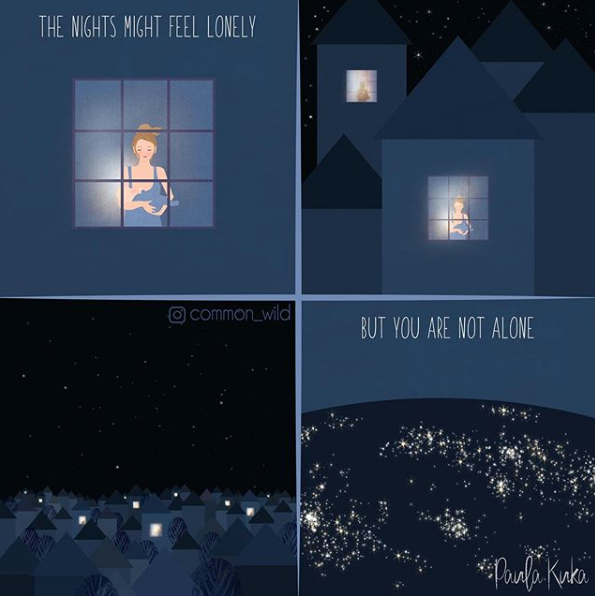Postpartum Depression
The Light Through Postpartum Isolation
Prioritizing your support network during the pandemic can reduce the struggle.
Posted April 23, 2020
The coronavirus pandemic is making clear that many of the ways of living we considered normal and never second-guessed were not really serving us.
It has been known to maternal mental health professionals for a long time that our modern family and social structures leave parents disconnected and without enough support. This puts way too much pressure on immediate caregivers alone, increasing feelings of loneliness and stress, and thereby increasing the risk of developing postpartum symptoms. Sheltering in place is profoundly underscoring this unfortunate reality.
We were never meant to care for children in isolation.
Like many other animals, we have an evolutionary drive to connect and form social bonds. In generations past, it was the norm, not the exception, to live in multigenerational households and in tight-knit neighborhoods that were true communities, not just a collection of dwellings. This set-up served an important practical function by spreading the burden of childcare but also offered deepened meaningful relationships with those around us—what many psychologists would argue is key to a happy life and provides a safety net of emotional support during challenging times.
Many of us live far away from our own parents and extended families. Similarly, our friends are scattered geographically. Or maybe we spent our pre-baby years focusing on work and moving around and don’t have a strong network of friends or a community we feel a part of. Our workplaces are woefully unsupportive of mothers. We are not set up to thrive as new parents.
In general, loneliness and emotional isolation are dangerous. There is a growing body of research suggesting that loneliness can be as bad for your health as smoking. Conversely, the clearest predictor of lifelong happiness is the strength of a person’s relationships in middle age, many of which start in earlier phases of life.
As it relates to the postpartum period, we know that lack of social support and perceived loneliness are huge risk factors for developing postpartum depression or anxiety. In other words, when a mother has a larger social network, she is less likely to experience postpartum depression.
It cannot be overstated how important community and connection are for new parents.
Having a baby is already an isolating experience. It is all-consuming and non-stop. Our own needs fall to the bottom of the list. We often feel perpetually doubtful, stretched thin, and trying to live up to unreasonable expectations. Connecting with others can ameliorate some of those feelings.
To be a little more specific, here are some of the benefits that community and connection provide in the early months of having a baby (pandemic or not):
Practical support:
Having family members and friends around can be critical in helping to relieve the burden of direct childcare (e.g., changing a few diapers, holding the baby when they are fussy, giving new parents breaks so they can rest and recharge) and to assist with all the other ongoing tasks that become challenging when caring for a baby (e.g., washing dishes, making meals and acquiring groceries, taking out the trash, watching older siblings).
Shared joy:
Part of the joy of having a baby is getting to welcome them to your community—to have loved ones dote and share in your fascination and love for your new baby.
Access to knowledge and resources:
There are countless issues we run into in early parenthood, e.g., infant feeding and sleep challenges, that can feel acutely stressful but are common. Talking to other parents of babies in the same boat, connecting with friends or relatives who have been through it, or having easy access to professionals can create opportunities to get helpful, applicable information. “Oh, you’re having trouble with x? Have you reached out to y? Read z?" It can provide some reassurance and shore up confidence. Now, it can certainly be problematic to have too much information and input, but a dearth of it can be challenging and anxiety-provoking.
Breaks from the monotony of caring for a baby:
Getting coffee or taking a walk with someone, anyone, can break up the endless cycle of infant care—feeding the baby, playing a little, putting the baby down for a nap, panicking about what to do with your precious nap time window, washing bottles, doing laundry, maybe showering, probably not showering, feeding the baby, repeat. Being around others can help us forget how tired we are for a few minutes and give us just enough resolve to get back into the cycle.
Maintained identity:
Because caring for a baby can be all-consuming, it can also eclipse our former identities and degrade our sense of self. Connecting with others can remind us that feeding, changing, and soothing an infant is not our sole purpose in life.
Reduced feelings of shame and isolation:
One of the core themes of postpartum depression and anxiety is the cognitive distortion “I’m a bad mom. I don’t know what I’m doing.” For some, that results in feelings of despair and resignation; for others, fear and worry.
Either way, sharing our experiences and giving them a voice, instead of letting our beliefs bounce around in our heads and gain steam, is a direct antidote to shame and doubt. We can get confirmation that no one really knows what they’re doing, we’re all scared and uncertain and think that everyone else has it together, and we're not the only ones struggling in some form or another.
It’s invaluable and healing. Even if it was really hard to get myself there and even if I didn’t want to go, I felt buoyed and relieved every time I got to chat with another mother at a breastfeeding support group or baby yoga class (or whatever blur of activities I did during maternity leave that involved other mothers). Even exchanging compassionate and knowing smiles with parents of babies I’d pass in the grocery store or other public spaces was a subtle reminder that I was not alone.
All of these benefits work together to lower baseline stress and allow for more flexible responses to anxious and depressive thoughts and moods. To be deprived of these opportunities to connect is insidious and dangerous. It exacerbates the fear and disconnection many new parents already experience—in a time when they need it the most.
When you are already exhausted, barely hanging on physically and emotionally, and struggling to make it from one hour to the next, reaching out to utilize and extend your support network can feel like one more thing to do. But to get through this postpartum period while physical distancing due to the coronavirus pandemic, you must prioritize connection (ideally in addition to applying therapeutic techniques to tackle distressing thoughts and sensations as they arise).
There is no replacement for in-person contact, but it is not impossible to still find moments of connection and turn to creative avenues to invite support. Send up a flare—text four friends right now or ask a relative to come by (with food) and chat outside at a safe distance. Go out of your comfort zone—sign up for an online support group (see below for resources). Look into professional support—reach out to a therapist, prescriber, postpartum doula, lactation consultant, etc.
All this said, some parents in the early months of having a baby are finding that the forced distance from others and a slower pace of life are just what they need to ease some pressure and fully focus on the new family structure and routines. Whatever you're feeling, there is no wrong way to feel right now.
Finally, it is important and powerful to offer yourself compassion. Remind yourself that this situation is a direct challenge to our evolutionary wiring. Parenting in the best of circumstances pre-COVID-19 was a disconnected and often difficult experience. What you are being asked to do right now is unreasonably challenging.
You will get through this, one way or another, but it will likely be far less painful if you make it your business to pad yourself against feelings of loneliness, in spite of physical isolation, by taking small steps to widen your support network. There is a sea of other parents on the other side of your screen thinking the exact same thing and wanting to connect.

Resources
As a general resource, Postpartum Support International has online support groups, a helpline (open 24/7), and local representatives that can help connect you with appropriate resources and care. You can also inquire with the hospital where you delivered. Many have support groups that have moved online for the time being.
Support groups (most are free)
Postpartum Support International
The Bloom Foundation
Partners in Parenting PIPsqueak Groups (Austin, TX)
The Womb Room (Baltimore, MD)
Dr. Yulia Koba, Psy.D, SEP. (California residents, $15)
Postpartum Wellness
The Nesting Place
Happy with Baby
Family Tree Wellness
Well Baby Center
Well-Mamas
Elizabeth Veltrie, MS, BC-DMT
Cortney Seltman
Compass Perinatal Peer Support
Postpartum Depression Project (Southwest Pennsylvania)
Hand to Hold (NICU-specific)
Beyond the Baby Blues
Nurture Online: Support for Moms
Mind Body Baby (Charlotte, North Carolina)
MomsWell
Everlasting Wellness LLC
honey. Space for Moms ($30/month)
Supporting Mamas (California)
MomSquad Virtual Support Meetup
Angela R. Wurtzel, LMFT (postpartum therapy group)
Flourish Counseling & Wellness ($20)
Ma Zen Space
Women's Health Innovations of Arizona
The Motherhood Center of New York
Penelope Oberhardt, LCSW
Moms Supporting Moms
Wellness & Co.
Uplift Counseling Services
Facebook groups
Postpartum Support International Facebook Group
Mama Thrive Village Parents
The Mother Side® Online Community—Empowerment, Education and Support
Mommy's Mental Health
Other Educational Resources
Cherished Mom
Moms Mental Health Initiative
Labor of Love: Birth & Postpartum
MotherWise Counseling (free texts focused on postpartum mental health)
Tender Mother Care Concierge
To find a therapist near you, visit the Psychology Today Therapy Directory.
References
Brooks, D. (2020, March 19). The Nuclear Family Was a Mistake. Retrieved from http://www.theatlantic.com/magazine/archive/2020/03/the-nuclear-family-…
Denworth, L. (2020). Friendship: the evolution, biology and extraordinary power of lifes fundamental bond. London: Bloomsbury Sigma.
Kleiman, K., & Wenzel, A. (2011). Dropping the baby and other scary thoughts: Breaking the cycle of unwanted thoughts in motherhood. Routledge/Taylor & Francis Group.
Vaezi, A., Soojoodi, F., Banihashemi, A. T., & Nojomi, M. (2019). The association between social support and postpartum depression in women: A cross sectional study. Women and Birth, 32(2). doi: 10.1016/j.wombi.2018.07.014




